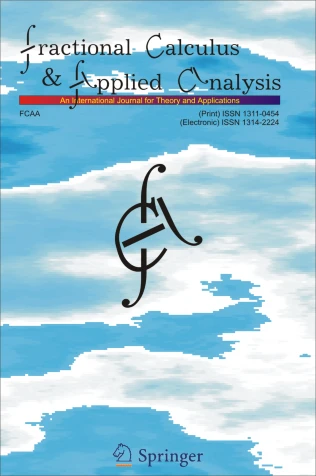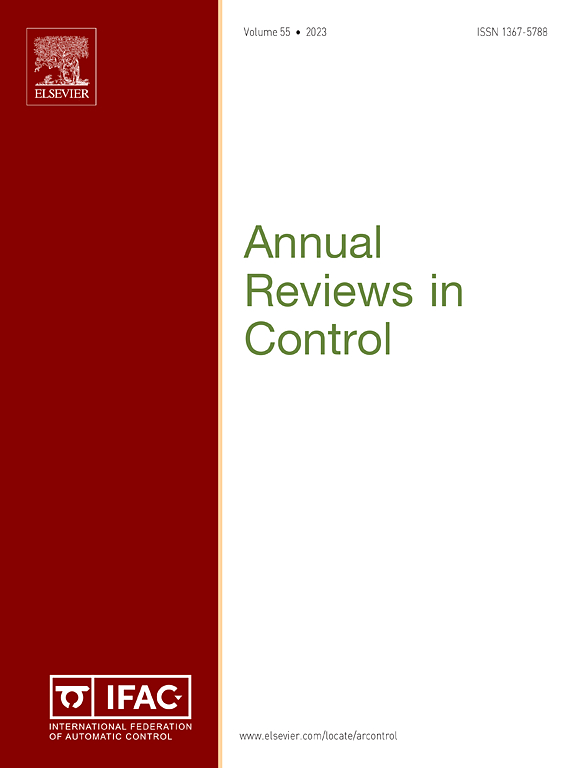
|
|
|
Submission > Call for papers
Call for Papers
The ICFDA is the largest event in the fractional calculus, held every two years since 2004. It offers the most up-to-date and complete view of Fractional Differentiation and its Applications, with the widest coverage of theoretical and application fields, and is attended by a worldwide audience of resaearchers and engineers from academia and industry. The congress program will include papers selected on the highest standard by the IPC, according to the IFAC guidelines, and published in Diamond Open Access in partnership with Elsevier in the IFAC-PapersOnline series, hosted on the ScienceDirect platform.
Download the First Call for Papers
The second Call for Papers is now available, and the submission deadline have been extended up to mid January.
Download the second Call for Papers
Submission Instructions
Papers and all other proposals must be submitted electronically using the IFAC PaperPlaza conference manuscript management system: www.ifac.papercept.net. All submissions must be in PDF format, written in English, and prepared according to IFAC format, see: ifac.papercept.net/conferences/support/support.php.
Areas and Keywords
The fractional-order differentiation of arbitrary orders takes into account the memory effect of most systems. The order of the derivatives may also be variable, distributed or complex. Recently, fractional-order calculus became a more accurate tool to describe systems in various fields in mathematics, biology, chemistry, medicine, mechanics, electricity, control theory, economics, and signal and image processing.
Topics of interest include, but not limited to:
- Automatic Control & Stability
- Artificial Intelligence
- Biology & Biomedicine
- Earth Science
- Electrical Engineering & Electromagnetism
- Electrochemistry
- Epidemics
- Finance and Economics
- History of Fractional-Order Calculus
- Image Processing
- Mathematical methods
- Mechanics & Viscoelasticity
- Mechatronics
- Physics
- Robotics
- Signal Processing
- Singularities Analysis and Integral Representations
- Special Functions
- System identification & Modeling
- System Analysis & Dynamics
- Thermal Engineering
- Variational Principles
Paper Categories
Contributors are invited to prepare and submit high quality original papers within the broad spectrum of the FDA areas.
There are three paper categories for the ICFDA 2024:
- Regular papers will have 6 pages length limitation in acceptance. Authors may upload longer manuscript up to a maximum of 8 pages total. However, each page in excess of 6 will incur an additional overlength page charge. At the time of initial submission, regular papers can be up to 8 pages for review.
- Survey papers overviewing a research topic are also most welcome, and 12 pages limitation will apply to such papers in acceptance. Authors may upload longer manuscript up to a maximum of 14 pages total. However, each page in excess of 12 will incur an additional overlength page charge. For initial submission, 14 pages are allowed.
- Discussion papers are introduced to encourage participation especially from industry and from colleagues outside the traditional academic control community. Such papers should be submitted in the form of extended abstracts typically between 2 and 4 pages in length, and the congress will accept a limited number of them based on ad hoc peer reviews. Authors will present their contribution in oral or interactive sessions. Discussion papers will appear only in the congress preprints, not in the congress proceedings.
Submission Categories
- Regular contributions presenting theoretical or application driven research with main focus on the theoretical or methodological contribution as well as application papers presenting research with main focus on concrete contributions to industrial, economics, or social fields.
- Open invited track contributions are to be part of open invited tracks. Such tracks have no limit on the number of papers, and organizers are expected to solicit contributions, and the track proposals are listed on the IFAC WC 2023 website leaving open the possibility for anyone to contribute. For more details, see here.
- Demonstrator contributions are for promoting and showcasing research or education-oriented devices, innovative prototypes and transferring technologies to the enterprise. For more details, see here.
Pre-Conference Tutorials
You are invited to submit a proposal for the pre-conference workshops and tutorials, which will inform participants about the state of the art in specific areas of interest to the IFAC community. These can be half-day, one-day or two-days sessions.
The tutorial sessions at ICFDA 2024 will take place on Monday, July 8 (full day) and Tuesday, July 9 (morning), 2024.
The ICFDA 2024 will offer half-day, full-day, or one and hal-day tutorials. Organizers are invited to prepare proposals with a clear focus on new and emerging topics within the general scope of automatic control. It is desirable that the workshops and tutorials are interactive, creating an engaging atmosphere for the participants. The organizers are also asked to make the events diverse and inclusive for people with different backgrounds and expertise.
The proposals for tutorials and workshops should be concise and must be limited to 6 pages in PDF format. There is no specific template but it should include the following items:
Type and duration: Specify whether the proposal is for a workshop or a tutorial and whether the event is half-day, full-day, or one and half-day.
Title of the tutorial
Organizers: Provide the name, affiliation, address, email address for each organizer, and indicate which organizer is the main contact.
Outline of the workshop/tutorial (topics and description): Please provide a short description of the proposed event in one paragraph (300 words maximum).
Description of the intended audience and the expected outcome of their learning. Please include the desired prerequisite knowledge of the audience.
Tentative schedule of the event
Brief biographies of the confirmed speakers
Additional points:
- It is important to include statements addressing why the workshop/tutorial is important and timely, how it is relevant to the ICFDA, why the speakers are qualified for a high-quality introduction of the topic, and how the organizers made efforts to have speakers from a diversity of demographics, geographic locations, and career stages.
- If a related workshop/tutorial was given before, describe when and where it was given and how it will be updated for the ICFDA 2024. If possible, provide a link to slides of the previous presentation.
- It is advisable for the organizers to create some web page of their own that helps to advertise the workshop/tutorial once the proposal is accepted.
- If there are fewer than 10 preregistered participants, the tutorial/workshop will be canceled.
- Indicate additional equipment if needed. A computer projector, screen, audio equipment (microphone and speaker) will be provided.
Submission of workshop/tutorial proposals should be made using the ifac.papercept.net site. Detailed information can be found in the submission procedure page.
Preprints, Proceedings & Copyright Conditions
Preprints, proceedings and copyright conditions are as requested by IFAC. For details, see here.
"All publication material submitted for presentation at an IFAC-sponsored meeting (Congress, Symposium, Conference, Workshop) must be original and hence cannot be already published, nor can it be under review elsewhere. The authors take responsibility for the material that has been submitted. IFAC-sponsored conferences will abide by the highest standard of ethical behavior in the review process as explained on the Elsevier webpage, and the authors will abide by the IFAC publication ethics guidelines.
Accepted papers that have been presented at an IFAC meeting will be published in the proceedings of the event using the open-access IFAC-PapersOnLine series hosted on ScienceDirect. To this end, the author(s) must grant exclusive publishing rights to IFAC under a Creative Commons license when they submit the final version of the paper. The copyright belongs to the authors, who have the right to share the paper in the same terms allowed by the end user license, and retain all patent, trademark and other intellectual property rights (including research data)."
Special issues in Journal publication
Fractional Calculus and Applied Analysis (FCAA), Springer
 A selection (10% of high quality papers) presented at ICFDA’2024 will be carried out, which fit best to the scope and policy of the journal in Mathematics. Please have in mind that FCAA is oriented to theoretical aspects of FC and its applications but mainly from mathematical point of view, and the results should be high level originality and quality. The authors will be able to propose an extended complete version of their work from the conference, survey papers are also encouraged. The contributions will be on the base of personal invitations sent by FCAA Editor to potential authors after the Conference, then detailed instructions will be given.
A selection (10% of high quality papers) presented at ICFDA’2024 will be carried out, which fit best to the scope and policy of the journal in Mathematics. Please have in mind that FCAA is oriented to theoretical aspects of FC and its applications but mainly from mathematical point of view, and the results should be high level originality and quality. The authors will be able to propose an extended complete version of their work from the conference, survey papers are also encouraged. The contributions will be on the base of personal invitations sent by FCAA Editor to potential authors after the Conference, then detailed instructions will be given.
Annual reviews in Control (ARC), Elsevier
 A selection (10% of high quality papers) presented at ICFDA’2024 will be carried out which fit best to the scope and policy of the journal in Automatic Control.
A selection (10% of high quality papers) presented at ICFDA’2024 will be carried out which fit best to the scope and policy of the journal in Automatic Control.
An ARC SPECIAL SECTION contains 5 to 8 papers plus a short Editorial. Most of the papers of an ARC Special Section must follow the usual ARC paper types, i.e., SURVEY articles (Review papers on main methodologies or technical advances), or VISION articles (Cutting-edge and emerging topics with visionary perspective on the future of the field or how it will bridge multiple disciplines), and TUTORIAL RESEARCH articles (Comprehensive conceptual approaches for propectives studies). A Special Section may contain also a few (one or two) technical papers with new results (named FLA, Full Length Article, in the Elsevier EM platform), provided that these techniques show potential great interest for the future research developpements on the topic of the Special Section.

